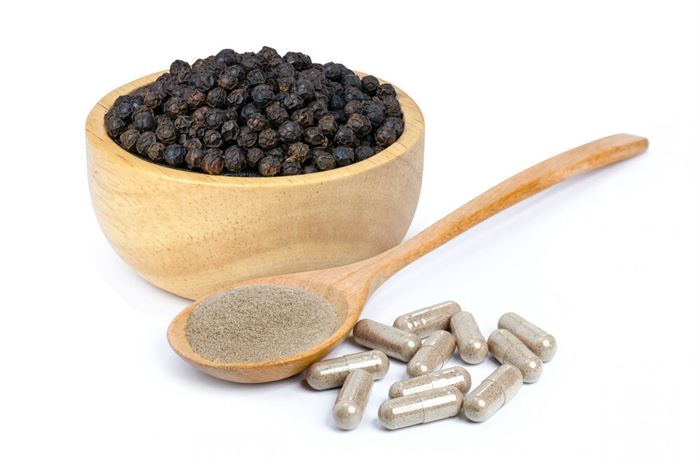Black pepper, a staple in kitchens worldwide, often raises an intriguing question: “Is black pepper good for you?” In this article, we’ll journey beyond its fiery flavor to uncover the truth behind this common seasoning. From diving deep into its nutritional facts to weighing the health advantages and potential pitfalls, and even tracing back to its historical medicinal roles — we aim to provide a comprehensive view on this ubiquitous spice. Join us as we explore every facet of black pepper’s influence on our well-being.

Contents
Black Pepper Nutritional Facts
Basic Introduction to Black Pepper’s Composition
Originating from the Piper nigrum plant, this globally revered spice is much more than just a kitchen staple. The peppercorns we grind and sprinkle onto our dishes are dried berries from the plant. Native to South India, it has now spread across continents, but what exactly makes this spice stand out?
Key Vitamins and Minerals
Diving into its nutritional profile, one can be surprised by the richness it holds. It’s not just about the spicy kick; it’s packed with vital nutrients. Among them, Vitamin K plays a significant role in ensuring our blood clots correctly. Furthermore, minerals like manganese contribute to bone health and the metabolism of amino acids, carbohydrates, and cholesterol. These constituents, although present in small amounts, provide essential micro-benefits that can enhance overall health when consumed regularly.
Bioactive Compounds in Black Pepper
The most intriguing element within this spice is piperine. This bioactive compound doesn’t just provide the distinctive pungency but is also crucial in increasing the absorption of other nutrients. By boosting the bioavailability of compounds in other foods and supplements, piperine ensures we get the maximum benefit from what we consume. It’s an unsung hero that elevates the importance of our everyday seasoning.
Through these facets, one can truly appreciate the depth and value this seemingly simple spice brings to our tables and our health.

Black Pepper Health Benefits and Risks
Boosting Digestion
Among its many attributes, the peppercorn is known to be a digestive dynamo. It stimulates the taste buds, signaling the stomach to produce more hydrochloric acid. This acid is essential for digesting food, especially proteins. By doing so, black pepper ensures efficient digestion and helps prevent conditions like indigestion and heartburn.
Antioxidant Properties
Peppercorns are not just about flavor; they’re packed with antioxidants. These compounds battle against oxidative stress, a key factor behind numerous chronic diseases. By neutralizing free radicals in the body, this humble spice plays a significant role in defending our system from potential health threats.

Enhancing Nutrient Absorption
One of the standout compounds in peppercorns is piperine. Its magic lies in its ability to amplify the benefits of other nutrients. Notably, it enhances the absorption of curcumin, a compound found in turmeric known for its anti-inflammatory effects. Together, they become a potent health duo, maximizing the benefits derived from our diet.
Potential Risks and Precautions
However, it’s essential to approach its consumption with a measure of caution. Some individuals might experience allergies or sensitivity to this spice. Overindulging can lead to stomach upset or exacerbate acid reflux. Furthermore, when mixed with certain medications, it can modify drug absorption. It’s always advisable to consult a health expert if one is on medication or suspects an allergy.
In moderation and with awareness, this spice offers a balance of benefits and risks, making it an intriguing addition to our culinary and wellness toolkit.
The History and Medicinal Uses of Black Pepper
Black Pepper in Ancient Civilizations
Originating from South Asia, black pepper quickly became the world’s most traded spice. In ancient times, its worth was often compared to gold, leading to it being referred to as “black gold”. Beyond its culinary appeal, civilizations like the Romans and Egyptians recognized its medicinal value. It was frequently used to treat ailments ranging from indigestion to respiratory disorders. This treasured spice’s role was not merely culinary; it was an emblem of health and prosperity.

Traditional Remedies Involving Black Pepper
In traditional medicinal systems, especially Ayurveda, black pepper has been an essential ingredient for various remedies. Known as “Marich” in Sanskrit, it was believed to rejuvenate the body and enhance longevity. Used both as a standalone remedy and in combination with other herbs, it played a vital role in treating coughs, colds, and digestive issues, highlighting its versatile nature.
Modern Science Weighs In
Fast forward to today, and scientific research corroborates many of these ancient beliefs. Studies have shed light on its anti-inflammatory, antioxidant, and antibacterial properties, giving credence to the anecdotes of yore. While not every historical claim has scientific backing, the modern consensus is clear: black pepper does pack a potent health punch, making its ancient reverence well-deserved.
Diving into the annals of history, it becomes evident that this simple spice has interwoven itself into the tapestry of human health and culture, standing the test of time.

In Retrospect: The Tale of the Peppercorn
Venturing through the annals of history, the nutritional depth, and the myriad health implications of this spice, we circle back to our pressing query: “Is black pepper good for you?” Undoubtedly, its myriad benefits, from aiding digestion to potent antioxidant properties, sing its praises. Yet, as with everything, moderation is key. Awareness of potential sensitivities and interactions ensures we derive the best from this “black gold.” As you savor its piquant flavor, remember you’re not just enhancing your dish but potentially boosting your health too. Here’s to sprinkling a dash of mindful peppery goodness into our lives!


